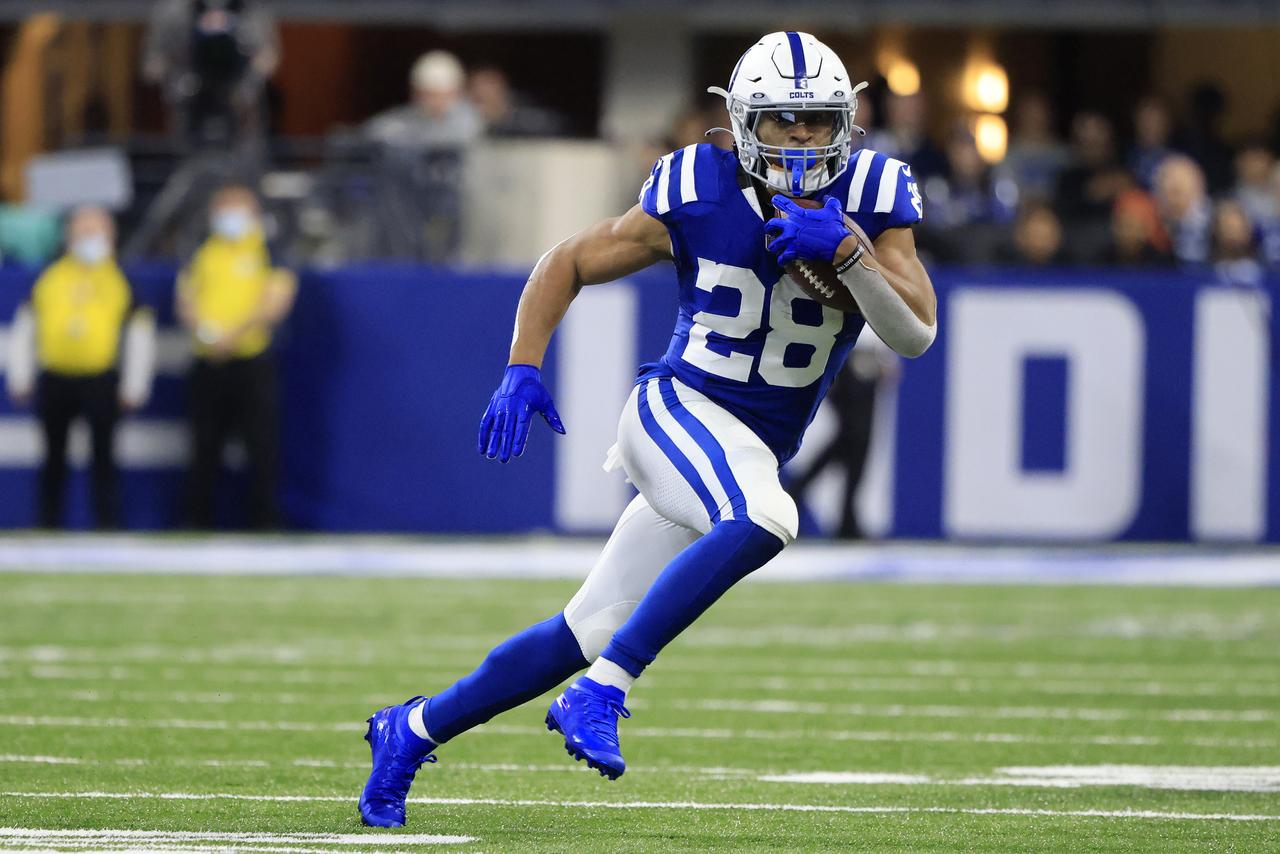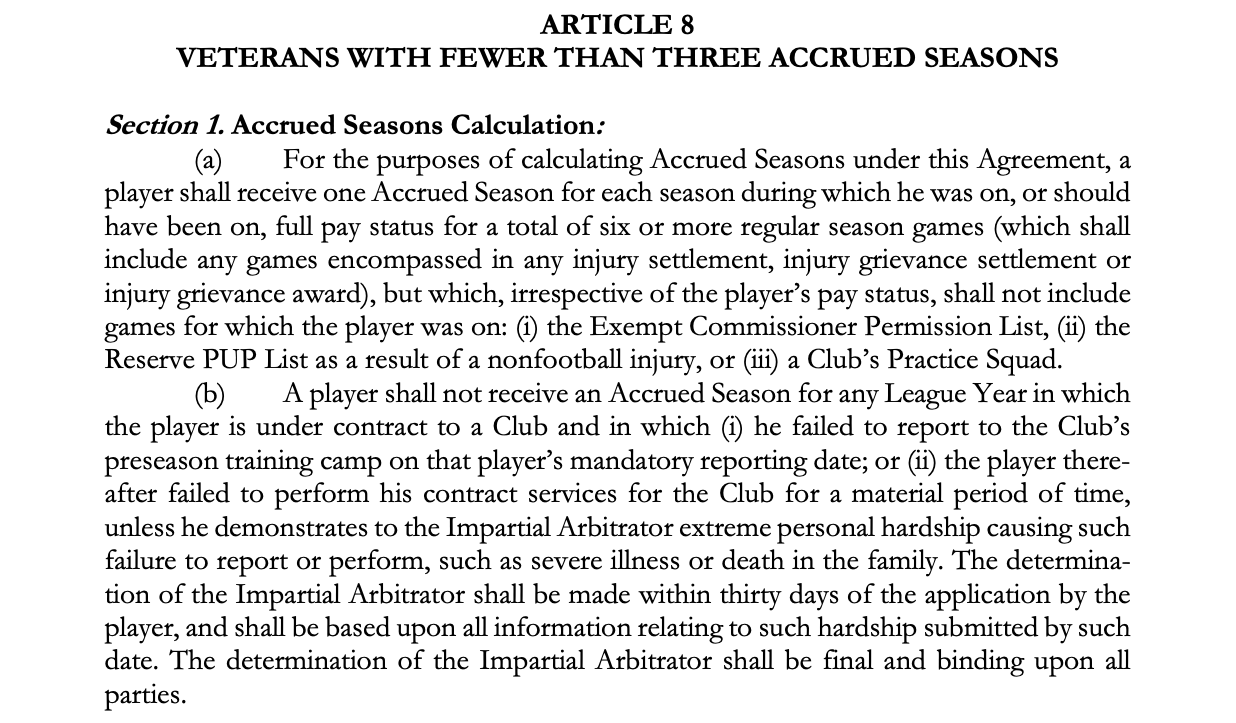Jonathan Taylor Trade Request: What It Means for Fantasy Football

The Colts and Jonathan Taylor headline the feud between NFL running backs and the recently signed NFL Collective Bargaining Agreement. Taylor has the pedigree, stats, and film to be one of the highest paid RBs, but it's very hard for him to reach unrestricted free agency.
A former 2nd-rounder, Taylor is in the final year of his rookie contract before he'd be eligible for a very-likely 2024 franchise tag and a potential 2025 franchise tag. The Colts essentially have his rights for $5M this year and roughly $10M next year. Taylor believes he's worth well more than that, and he's now eligible for a contract extension after completing his 3rd rookie season. The 4th offseason is when Ezekiel Elliott famously got a huge RB contract, but that's not the market for the position now. This offseason, almost every big RB contract came with a release (Dalvin Cook, Elliott) or a hefty pay cut (Aaron Jones, Joe Mixon).
It's hard to work out a long-term deal with the team having the franchise tag in their back pocket, so Taylor can't expect too much more than the $16M or so he's set to make over the next 2 seasons. Colts owner Jim Irsay made it clear that the NFL Player's Association agreed to the tag in the CBA, so he doesn't plan on offering him a long-term contract right now, per ESPN's Stephen Holder (who has been on fire with his reporting here).
What Are Jonathan Taylor's Options?
1. Facilitate A Trade
Assuming Irsay will continue not offering Taylor a long-term extension this early into Taylor's contract, finding a trade partner is Taylor's best-case scenario, which is why he's asked for a trade already.
The feasibility of this is tricky, however. The Colts think Taylor is worth more than what he's being paid for the next 2 years, so they reportedly "would be seeking an early-round draft pick". Let's say that's a 2nd or 3rd round draft pick based on recent trades. There'd be teams who would offer that for him ... if his current contract was being inherited. That clearly isn't happening given Taylor's contract demands. An acquiring team would have to give up somewhere around a Day 2 pick for the right to sign him to market-rate contract extension. That means at least $5M in 2023, $10M in 2024, and somewhere around $12M in 2025.
The other issue is even if there's a team willing to do trade-and-sign him, Irsay said, "We will not trade Jonathan Taylor. That is a certainty. Not now or not in October. That is the bottom line.'' Both parties holding firm ... for now.
2. Hide Behind Injury
If Taylor wants to avoid the wear-and-tear on a likely bad team without long-term money, he can attempt to hide behind his ankle injury. Taylor had offseason ankle surgery, yet didn't pass a physical before training camp. The Colts put him on the PUP list, even though his ankle should be healed by now and even though Irsay claimed Taylor was healthy weeks prior. Reports suggest Taylor's team was surprised the Colts put him on the physically unable to perform list, as if Taylor and the Colts knew they'd be in a serious contract dispute leading into training camp.
Because Taylor is on the PUP list and is standing on the sidelines at camp, he's not being fined $40,000 per day like other rookie-contract players would be in a holdout event. Taylor could keep that up for the entire training camp without being fined. He also could risk accruing the fines if he gets moved off the PUP list because rookie-contract players can get their team fines reimbursed if the team agrees to it. Veterans can't get their fines reimbursed.
With this said, Taylor can only hide behind injury for so long. Taylor needs to accrue his 4th NFL season to get this rookie contract and franchise tag behind him. This is from the great Joel Corry of CBS:
"Players in the final year of a 4-year rookie contract should probably walk a fine line with a hold in. There's language in the CBA about not earning an accrued season with a failure to perform contract services for a material period of time. Without the 4th accrued season, a player would be a restricted free agent at the expiration of his rookie contract."

Taylor essentially has to play some ball this year, and for every game he opts out of, Taylor would be losing out on 1/17th of his $5.1M contract ($300k). Not fun for a player who has only made $6M from the Colts to date.
3. Play Without A Long-Term Deal
The easiest solution would be for Taylor to just play the season out as if nothing had happened this offseason. It's the solution that the NFL CBA suggests will happen most often in contract disputes like this.
It's unfair for Taylor, but the next NFL CBA will need to address the RBs' weighted inequality of the franchise tag. Other positions have longer shelf lives, so they can reap the rewards of unrestricted free agency after the years of the franchise tag. When RBs finally reach unrestricted free agency right now, their wear-and-tear is used against them in contract negotiations. That means their contracts are lower, which then makes the franchise tag for the upcoming RBs even less because the franchise tag formula uses the highest-paid RB contracts. This unfair cycle will cause tension until the next CBA, so get prepared for lots of contract disputes at a position that drives a ton of eyeballs, jersey sales, and offseason discussion with fantasy football. I'd love to see guaranteed bonuses based on performance in an upcoming CBA. For example, any RB who has 250 carries plus receptions in a season gets a $1M bonus.
Where Does This End?
The situation is spicy enough that a trade is definitely possible. A team that is desperate for talent and has massive amounts of cap space for the next few seasons (like the Bears) can come calling. Teams that are in Super Bowl contention without a star RB (like the Bills) could back-load a contract offer. It'll just be hard to get Irsay to change his mind on not trading a franchise player on a contract-controlled deal, however, so a trade is not a layup despite the tension.
The slightly more realistic outcome would be Taylor's status lingering during training camp (while both parties can hide behind that ankle injury) before Taylor is left showing up for games so he can accrue his 4th NFL season. There would be risk that Taylor wouldn't play through in-season injuries as he otherwise would, in addition to some minor risk that'd he'd skip games while healthy. But the Colts are already threatening to put him on the non-football injury list (NFI) because of an offseason back injury that occurred while training on his own, which would mean the Colts wouldn't have to pay him if he missed time. This puts Taylor's leverage of a holdout even less.
For fantasy football purposes, there's minimal downside risk of a holdout and there's some upside that a trade happens. Because the Colts have a dual-threat rookie QB, Taylor's fantasy environment heading into 2023 was as bad as it gets. He doesn't project for many receptions, nor red zone looks. If a team trades for him, it's likely that his fantasy environment is actually better than it was before all this news unfolded. For now, I have Taylor as a borderline 2nd/3rd round pick. There's a chance he'd be a consensus 1st-rounder again if you're willing to risk it.
Colts RB Depth Chart
If Taylor is traded, the Colts likely would add a veteran. That could be the Leonard Fournette or Ezekiel Elliott types in free agency, or it could be a RB swap in addition to the draft assets involved in the trade. The funniest outcome would be the Chiefs trading for Taylor and giving away Clyde Edwards-Helaire, who they drafted ahead of.
In the meantime, Zack Moss is the starter on early downs and in short yardage situations. After the Colts acquired him in the Nyheim Hines trade last year, Moss averaged 4.8 yards on his 76 carries, while only catching 4 passes in 8 games. In his 4 starts without Taylor last year, Moss averaged a 17-84-0.3 rushing line on 63% offensive snaps. For reference, Taylor averaged a 19-86-0.4 rushing line in his 10 healthy contests in 2022.
Moss is attempting to hold off 5th-round rookie Evan Hull out of Northwestern. The redshirt junior declare has some size (210 pounds) and was a bellcow in college. His tape was mediocre in my opinion, and most of his pre-draft profiles suggested he'd be a passing-down complement because he lacked juice. For now, Hull is competing with Deon Jackson, who caught 30-of-34 targets in this scat back role last season.